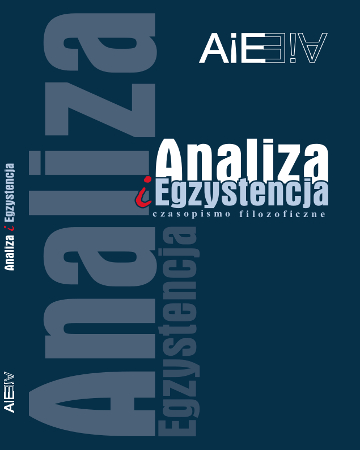
ISSN: 1734-9923
eISSN: 2300-7621
OAI
DOI: 10.18276/aie.2016.34-06






Lista wydań /
34 (2016)
Czy przyjaźń etyczna nie jest przyjaźnią pozorną? - rozważania wokół drugiego rozdziału siódmej księgi " Etyki eudemejskiej"
| Autorzy: |
Maciej
Smolak
Instytut Filozofii UJ |
| Słowa kluczowe: | przyjaźń etyczna prawdziwy przyjaciel szlachetny człowiek dobry człowiek |
| Data publikacji całości: | 2016 |
| Liczba stron: | 23 (111-133) |
Abstrakt
IS NOT THE ETHICAL FRIENDSHIP THE APPARENT FRIENDSHIP?– INTERPRETATIONS OF THE EUDEMIAN ETHICS 1237B6–7SummaryIn The Eudemian Ethics 1237b6–7 Aristotle seems to suggest that if the ethicalfriend has an unpleasant odour, he is left by his friend. The article is devoted todemonstrating that the ethical friendship is not the apparent friendship. For thispurpose author presents the characteristics of the true friend and distinguishes twotypes of the ethical friendship, the first between good men, i.e. men with a typicalmixture of good and bad traits of character, the second between noble men, i.e.the best men who are heroes of intellect and character – intellect because prudent,character because noble.On this basis author shows three interpretations which neutralize controversialstatement. According to the first interpretation – called “superhuman stink” – unpleasantodour is impossible to endure for the men, even good or noble. Thereforeethical friend must leave his friend in such circumstances. According to the secondinterpretation – called “one-dimensional courage” – ethical friend, who has anunpleasant odour is left by ethical friend, since one, who leaves can not endurestinking friend. The reason is that he has one-dimensional courage and apart fromdirect hostilities he does not cope with own weakness. According to the third interpretation– called “heroic solitude” – ethical friend, who has an unpleasant odourdoes not want to grieve his friend. Therefore decides to heroic solitude – heroic,since a human being is a civic being and one whose nature is to live with others– and leaves his friend.
Pobierz plik
Plik artykułu
Bibliografia
| 1. | Aristote (1959), L’ Éthique ŕ Nicomaque, Tome II: Commentaire par R.A. Gauthier |
| 2. | et J.Y. Jolif J.Y., partie 1 et 2, Louvain: Publications Universitaires. |
| 3. | Aristotele (2012), Etica Eudemea, Introduzione, traduzione e note di Marcello |
| 4. | Zanatta, Milano. |
| 5. | Aristoteles (1960), Aristotelis Opera, ex recognition I. Bekkeri, edition altera quam |
| 6. | curavit O. Gigon, Berolini. |
| 7. | Aristoteles (1962), Eudemische Ethik, übersetzt von F. Dirlmeier, Berlin: Akademie- |
| 8. | Verlag. |
| 9. | Aristotle (1954), Ethica Eudemia, transl. J. Solomon, London: Oxford University |
| 10. | Press. |
| 11. | Aristotle (1962), The Eudemian Ethics, transl. H. Rackham, London: The Loeb |
| 12. | Classical Library. |
| 13. | Aristotle (1996), Eudemian Ethics, Books I, II, and VIII, Transl. with a Commentary |
| 14. | by M. Woods, Oxford: Clarendon Press. |
| 15. | Aristotle (1988), Nicomachean Ethics, Books VIII and IX, Transl. with a Commentary |
| 16. | by M. Pakaluk, Oxford: Clarendon Press. |
| 17. | Arystoteles (1977), Etyka Eudemejska, tłum. W. Wróblewski, Warszawa: PWN. |
| 18. | Bostock D. (2000), Aristotle’s Ethics, New York: Oxford University Press. |
| 19. | Broadie S. (1991), Ethics with Aristotle, New York: Oxford University Press. |
| 20. | Cooper J.M.C. (1977), Aristotle on the Forms of Friendship, Review of Metaphysics, |
| 21. | vol. 30. |
| 22. | Engberg-Pedersen T. (1983), Aristotle’s Theory of Moral Insight, Oxford: Clarendon |
| 23. | Festugière A.J. (1946), Aristote. Le plaisir (Eth. Nic. VII 11–14, X 1–5), Introduction, |
| 24. | traduction et notes, Paris. |
| 25. | Fortenbaugh W.W. (1991), Aristotle’s Distinction between Moral Virtue and Practical |
| 26. | Wisdom, in J.P. Anton and A. Preus (eds.), Essays in Ancient Greek |
| 27. | Philosophy, iv: Aristotle’s Ethics, New York: Albany State University of |
| 28. | New York Press. |
| 29. | Galewicz W. (2002), Z Arystotelesem przez greckie tragedie, Cz. 1, Glosy i ilustracje |
| 30. | do „Etyki nikomachejskiej”, Kraków: Wydawnictwo Literackie. |
| 31. | Irwin T.H. (1990), Aristotle’s First Principles, Oxford: Clarendon Press. |
| 32. | Jaeger W. (2001), Paideia, tłum. M. Plezia i H. Bednarek, Warszawa: Fundacja |
| 33. | Aletheia. |
| 34. | Kenny A. (1978), The Aristotelian Ethics, Oxford: Clarendon Press. |
| 35. | Pakaluk M. (2005), Aristotle’s Nicomachean Ethics, Cambridge: Cambridge University |
| 36. | Pangle L.S., (2003), Aristotle and the Philosophy of Frienship, Cambridge: Cambridge |
| 37. | Univeristy Press. |
| 38. | Reiner P. (1991), Aristotle on Personality and Some Implications for Friendship, |
| 39. | Ancient Philosophy, vol 11. |
| 40. | Smolak M. (2013), Przyjaźń w świetle etyki Arystotelesa, Kraków: Wydawnictwo |
| 41. | Uniwersytetu Jagiellońskiego. |
| 42. | Sofokles (2009), Filoktet, [w:] Sofokles, Tragedie, t. I, tłum. R.R. Chodkowski, |
| 43. | Lublin: Towarzystwo Naukowe KUL i Katolicki Uniwersytet Lubelski Jana |
| 44. | Pawła II. |
| 45. | Stern-Gillet, S. (1995), Aristotle’s Philosophy of Friendship, Alabany (NY). |
| 46. | Vlastos G. (1973), The Individual as Object of Love in Plato, in Platonic Studies, |
| 47. | Princeton: Princeton University Press. |